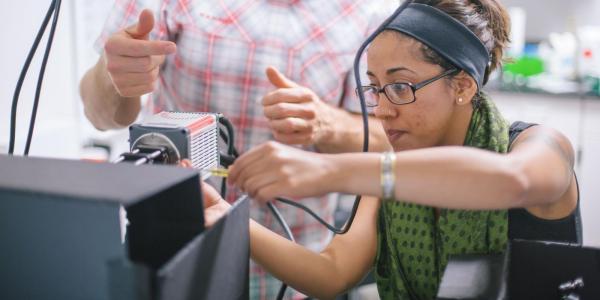The Master of Integrated Sciences program provides a rigorous and focused graduate interdisciplinary curriculum that spans natural and physical sciences, mathematics, and engineering. We are not only committed to a prestigious graduate education but also to the exploration of independent research studies that integrate curriculum into experiential training. Our commitment is grounded in the traditional liberal arts and sciences philosophy, which emphasizes critical and creative thinking and problem-solving skills. Ultimately, bridging traditional disciplinary domains and mastering their integration, as is both natural and required at the highest level of scientific exploration.
In this context, upon graduating, students of the Master of Integrated Sciences program will:
- Understand the scientific method and the role of ethics in scientific endeavors
- Be able to critically analyze a range of scientific literature that utilizes interdisciplinary techniques and methods
- Attain foundational content knowledge in two STEM disciplines appropriate to the individual student’s goals
- Design, plan, and execute an individualized research project or thesis that embodies the integration of the content knowledge from chosen disciplines
- Present and defend the results of their work in written and oral form
There may be additional student-specific goals, in keeping with the individually structured nature of the program.
Depth and Breadth Requirements
At the start of their program, students will work with the MIS director to design an individualized curriculum tailored to their research interests and select two to three departments within the College of Liberal Arts and Sciences (CLAS) from which to take courses to fulfill that curriculum. By the end of their first semester, each student will have developed a program goal statement to summarize their interests and provide a direction for their studies.
To ensure core program requirements are met, the student must take a minimum of 9 credits in a chosen primary area of concentration. The courses that follow are tailored to focus on a multidisciplinary research area, ultimately culminating in either a Master’s thesis or a Master’s project. Additionally, to expand the options available to MIS students, courses can be taken at either the Anschutz Medical Campus (AMC) or in non–CLAS departments (i.e. engineering) on a case-by-case basis.
Upon graduation, students will have completed 30 semester hours of interdisciplinary study, setting them apart from other science master's graduates. The 30 total credit hours include:
-
The single required core course is MINS 5200 - Research Methods in Interdisciplinary Sciences. MIS students must enroll in the course during their first fall semester.
-
Total of 9 hours in a primary discipline and 6 hours in a secondary discipline.
-
Project (3-4 hours) or Thesis (4-6 hours) - During the MIS program, students will conduct independent research resulting in a thesis or project, presented to their committee in written form and subject to an oral defense.
College of Liberal Arts and Sciences Departments
The MIS program targets the natural, physical, mathematical, and computational sciences. As such, the primary departments from which students typically choose their emphasis are biology, chemistry, computer science, electrical engineering, geology, geography (select courses only), mathematics, and physics.
Research
All students will select an advisor in their area of focus with whom to complete research. This research will culminate in either a Master’s project (3-4 credits) or a Master’s Thesis (4-6 credits). These credits do apply to the 30 credit hour requirement. Students will select a committee of no less than three graduate faculty (including the advisor), spanning the student’s departments, who will serve as the project/thesis defense committee.
Interested in the types of research that MIS Alumni have conducted? Click here to view sample abstracts.
Special Courses
Two course options, MINS 5000 and MINS 5840, exist to help students find coursework in areas where graduate courses are not taught. MINS 5000 serves as a cross listing for any 4000 level CLAS course. The students will attend and participate in (including all assignments and exams) the associated 4000 level course and will arrange for additional material and evaluation with the professor and the program director. A common example would be to complete the standard 4000 level class and complete a graduate level project in a related subject. MINS 5840 is a graduate level independent study. Both of these options require prior approval from the program director and a professor. In extreme cases, where the above courses are not options, MIS students can petition to take 4000 level courses. Program policy allows for up to 6 hours of 4000 level work to be applied, however, this is discouraged whenever other options exist.




